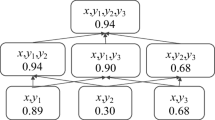Abstract
Data envelopment analysis (DEA) is a model for measuring the efficiency of decision-making units (DMUs). The majority of DEA models suffer from drawbacks, in particular, changes in the weights of inputs and outputs. Consequently, the efficiency of DMUs is measured with different weights and so it is important to establish how to evaluate all DMUs using a common weight to optimize their efficiency at the same time. This study provides a new algorithm to overcome the weaknesses of the previous model. The proposed algorithm based on the bootstrap simulation establishes a bound for the input and output weights. Common weights are obtained by solving this model using bounded weights. According to the results of a numerical example solved by this model, it outperforms conventional models in terms of ranking DMUs.
Similar content being viewed by others
References
Farrell, M.J.: The measurement of productive efficiency. J. R. Stat. Soc. Ser. A Gen. 120(3), 253–290 (1957)
Charnes, A., Cooper, W.W., Rhodes, E.: Measuring the efficiency of decision making units. Eur. J. Oper. Res. 2(6), 429–444 (1978)
Cook, W.D., Roll, Y., Kazakov, A.: A dea model for measuring the relative eeficiency of highway maintenance patrols. INFOR Inf. Syst. Oper. Res. 28(2), 113–124 (1990)
Roll, Y., Cook, W.D., Golany, B.: Controlling factor weights in data envelopment analysis. IIE Trans. 23(1), 2–9 (1991)
Hashimoto, A., Wu, D.-A.: A DEA-compromise programming model for comprehensive ranking. J. Oper. Res. Soc. Jpn. 47(2), 73–81 (2004)
Kao, C., Hung, H.-T.: Data envelopment analysis with common weights: the compromise solution approach. J. Oper. Res. Soc. 56(10), 1196–1203 (2005)
Jahanshahloo, G.R., et al.: A note on some of DEA models and finding efficiency and complete ranking using common set of weights. Appl. Math. Comput. 166(2), 265–281 (2005)
Liu, F.-H.F., Peng, H.H.: Ranking of units on the DEA frontier with common weights. Comput. Oper. Res. 35(5), 1624–1637 (2008)
Makui, A., et al.: A goal programming method for finding common weights in DEA with an improved discriminating power for efficiency. J. Ind. Syst. Eng. 1(4), 293–303 (2008)
Saati, S.: Determining a common set of weights in DEA by solving a linear programming. J. Ind. Eng. Int. 4, 51–56 (2008)
Chen, Y.-W., Larbani, M., Chang, Y.-P.: Multiobjective data envelopment analysis. J. Oper. Res. Soc. 60(11), 1556–1566 (2009)
Amirteimoori, A., Kordrostami, S.: Common weights determination in data envelopment analysis. Iran. J. Optim. 3(1), 199–210 (2009)
Zohrehbandian, M., Makui, A., Alinezhad, A.: A compromise solution approach for finding common weights in DEA: an improvement to Kao and Hung’s approach. J. Oper. Res. Soc. 61(4), 604–610 (2010)
Wang, Y.-M., Luo, Y., Lan, Y.-X.: Common weights for fully ranking decision making units by regression analysis. Expert Syst. Appl. 38(8), 9122–9128 (2011)
Saati, S., et al.: A common set of weight approach using an ideal decision making unit in data envelopment analysis. J. Ind. Manag. Optim. 8(3), 623–637 (2012)
Omrani, H.: Common weights data envelopment analysis with uncertain data: a robust optimization approach. Comput. Ind. Eng. 66(4), 1163–1170 (2013)
Bertsimas, D., Sim, M.: The price of robustness. Oper. Res. 52(1), 35–53 (2004)
Kiani Mavi, R., Kazemi, S., Jahangiri, J.M.: Developing common set of weights with considering nondiscretionary inputs and using ideal point method. J. Appl. Math. 2013, 1–9 (2013)
Borzoei, S., Zohrehbandian, M.: Common weights for the evaluation of decision-making units with nonlinear virtual inputs and outputs. Int. J. Data Envel. Anal. 1(3), 167–173 (2014)
Payan, A., Noora, A.A., Lotfi, F.H.: A ranking method based on common weights and benchmark point. Appl. Appl. Math. 9(1), 318–329 (2014)
Saati, S., Nayebi, N.: An algorithm for determining common weights by concept of membership function. J. Linear Topol. Algebra 4(3), 165–172 (2015)
Salahi, M., Torabi, N., Amiri, A.: An optimistic robust optimization approach to common set of weights in DEA. Measurement 93, 67–73 (2016)
Yekta, A.P., et al.: Data envelopment analysis with common weights: the weight restriction approach. Math. Sci. 12(3), 197–203 (2018)
Efron, B.: Computers and the theory of statistics: thinking the unthinkable. SIAM Rev. 21(4), 460–480 (1979)
Efron, B., Tibshirani, R.J.: An introduction to the bootstrap. Number 57 in Monographs on statistics and applied probability. Chapman & Hall, New York (1993)
Simar, L.: Estimating efficiencies from frontier models with panel data: a comparison of parametric, non-parametric and semi-parametric methods with bootstrapping. In: International Applications of Productivity and Efficiency Analysis, Springer, pp. 167–199 (1992)
Simar, L., Wilson, P.W.: Sensitivity analysis of efficiency scores: how to bootstrap in nonparametric frontier models. Manag. Sci. 44(1), 49–61 (1998)
Ferrier, G.D., Hirschberg, J.G.: Can we bootstrap DEA scores? J. Prod. Anal. 11(1), 81–92 (1999)
Simar, L., Wilson, P.W.: Of course we can bootstrap DEA scores! But does it mean anything? Logic trumps wishful thinking. J. Prod. Anal. 11(1), 93–97 (1999)
Simar, L., Wilson, P.W.: Testing restrictions in nonparametric efficiency models. Commun. Stat. Simul. Comput. 30(1), 159–184 (2001)
Simar, L., Wilson, P.W.: Non-parametric tests of returns to scale. Eur. J. Oper. Res. 139(1), 115–132 (2002)
Charnes, A., et al.: Cone ratio data envelopment analysis and multi-objective programming. Int. J. Syst. Sci. 20(7), 1099–1118 (1989)
Thompson, M., Ellis, R., Wildavsky, A.: Cultural Theory. Boulder, Colo. Westview Press, Boulder (1990)
Hatami-Marbini, A., et al.: A common-weights DEA model for centralized resource reduction and target setting. Comput. Ind. Eng. 79, 195–203 (2015)
Author information
Authors and Affiliations
Corresponding author
Additional information
Publisher's Note
Springer Nature remains neutral with regard to jurisdictional claims in published maps and institutional affiliations.
Rights and permissions
About this article
Cite this article
Amiri, A., Saati, S. & Amirteimoori, A. Determining a common set of weights in data envelopment analysis by bootstrap. Math Sci 14, 335–344 (2020). https://doi.org/10.1007/s40096-020-00344-7
Received:
Accepted:
Published:
Issue Date:
DOI: https://doi.org/10.1007/s40096-020-00344-7



